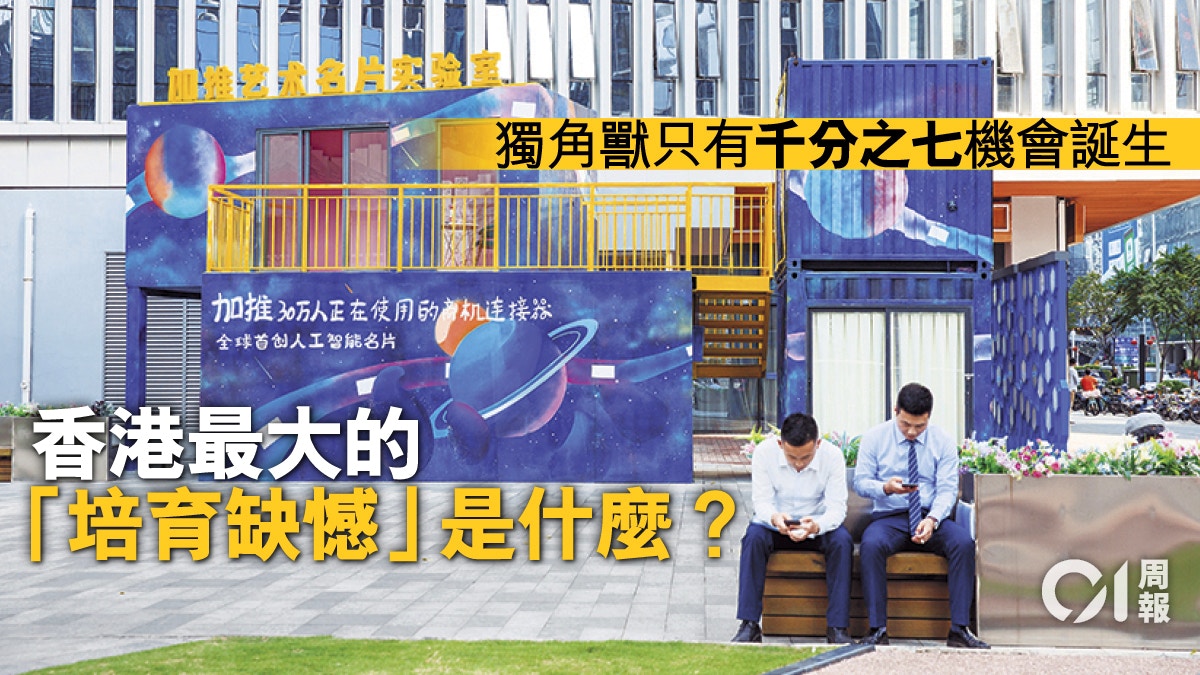weekly
Written by: Cao Minwei
2021-05-07 17:00
Last update date: 2021-05-07 17:00
There is a saying in Hong Kong: "High-tech, low-tech!" Xu Jiajian, a visiting associate professor in the Department of Economics at the Chinese University of Hong Kong, believes that it is not surprising that there are fewer start-ups in technology, and the industry knows these risks are very high. For investment projects, only a few out of a thousand will succeed.
SenseTime, the first unicorn company, was born in Hong Kong in 2017, much slower than the United States and Israel.
Hong Kong focuses on the financial and real estate industries, and it is difficult to compare with the big countries.
So, what is the biggest difficulty in breeding unicorns in Hong Kong?
Is the Greater Bay Area developing a utopia in the innovation and technology industry?
related articles:
"Unicorns" change the spirit of the new generation of the world and recreate the global economic map
The best opportunities in the worst times, the best opportunities for medical startups, the market is bullish
01: The local university has become a place for incubating unicorns?
Xu:
Many universities in Hong Kong are highly ranked in the world. It is not easy to raise a few famous universities in such a small city. This is also a major advantage of Hong Kong.
I have taught in many universities in Hong Kong and learned that many scholars are of high international standards.
University professors have in-depth research on academic theory, but it is not easy to implement their ideas and turn them into business opportunities.
Traditional universities are very knowledgeable, but doing business may not be very good.
Therefore, universities need to set up a structure to cooperate with external commercial organizations, and external funds and universities provide technology.
The government also knows that Hong Kong's innovation and technology is lagging behind, and in the past few years it has provided assistance to link the cooperation between universities and commercial organizations.
Many universities in Hong Kong are highly ranked in the world.
The picture shows the Hong Kong University of Science and Technology.
(Profile picture)
01: How have young people's attitudes towards innovation and technology changed?
Xu: In the
past, young people in Hong Kong wanted to stay in the comfort zone where the salary was high, because they wanted to make mortgage payments and want to live a stable life.
However, in the past ten years, property prices have become so expensive that young people do not want to buy a property extravagantly. Instead, they do not have to worry about mortgage issues and have a greater chance to start a business.
This generation of young people no longer pursue job stability, but instead value satisfaction.
Moreover, technologies such as artificial intelligence have also replaced middle-level positions in many industries. It is becoming more and more difficult to get promoted when working in large traditional institutions. It is better to go out and start a business.
In the past decade, the entrepreneurial trend has also become very stylish. A few successful examples will create an atmosphere, and young people are more eager to venture out.
The legendary figures like Elon Musk (Tesla founder Musk) make young people full of longing. Local unicorns such as Lalamove are all developed after a group of young people have a whim.
In addition, Xu Jiajian also shared his views on whether the business sector’s support for the innovation and technology industry is sufficient, what kind of assistance the government can provide to the innovation and technology industry, and what is the biggest difficulty in bringing unicorns locally. He also analyzed the respective issues of the Greater Bay Area and Hong Kong. For detailed access content, please read the full text of the "Hong Kong 01" weekly electronic journal.
The above is excerpted from the 263th issue of "Hong Kong 01" Weekly Report (May 3, 2021) "Interview with Professor Xu Jiajian, Professor of Economics, Hong Kong is difficult to conceive "unicorns" Is the Greater Bay Area an important post? ". If you want to read the full text, please
click here to
sample the weekly newsletter and browse more in-depth reports.
Featured content of the 263 issue of "Hong Kong 01" Weekly News:
[Cover report] Green bonds become a new trend, Hong Kong can become a green financial center
Meituan's anti-monopoly investigation and rectification of the platform economy has just begun
U.S. dollar hegemony begins to decline, forming a global trend of "de-dollarization"
Political turmoil does not stop at Modi's India epidemic affecting Indo-Pacific geostrategy
The new generation of unicorns that changed the world
The EU presents the strictest bill to supervise the AI era
Innovation, Technology and Innovation Bureau Greater Bay Area Creative Industries Hong Kong Economic 01 Weekly Report



/cloudfront-eu-central-1.images.arcpublishing.com/prisa/3I74UEXLYRBBRPGPSGWNN6WXH4.jpg)



